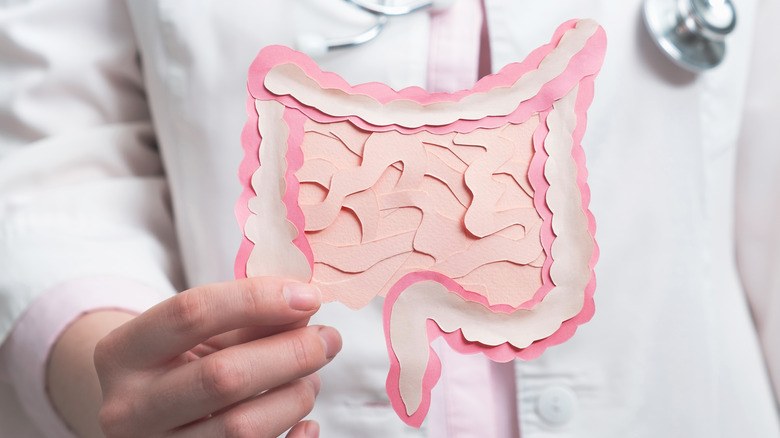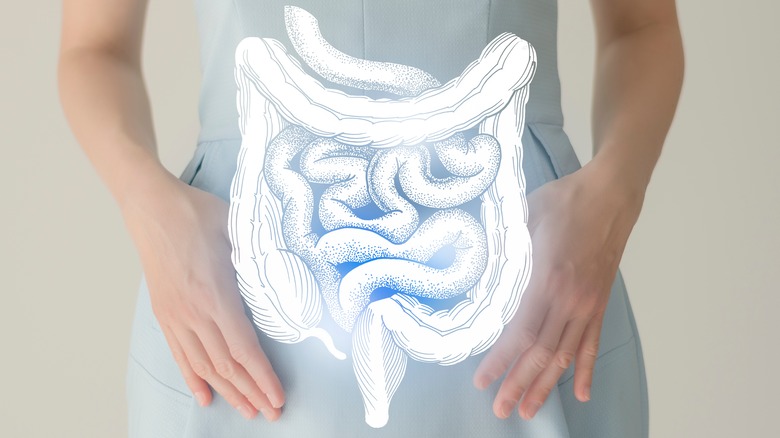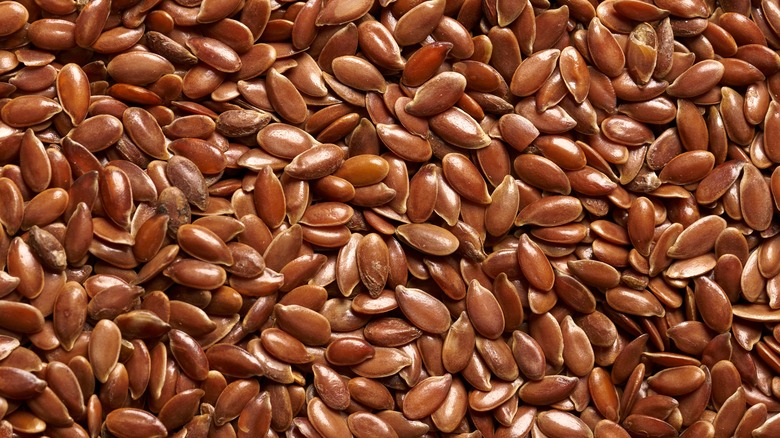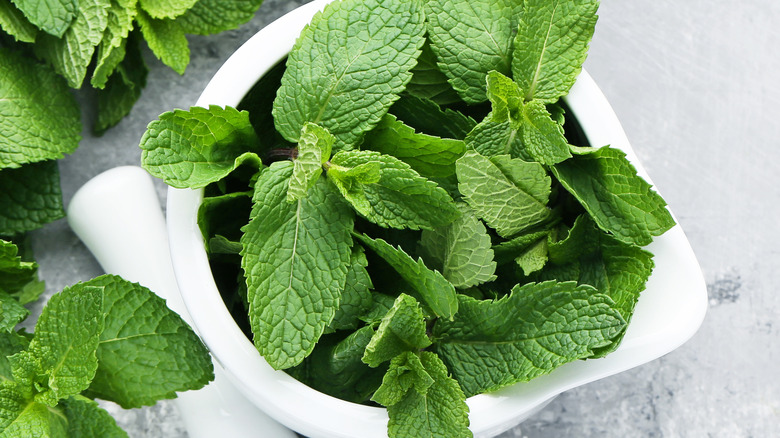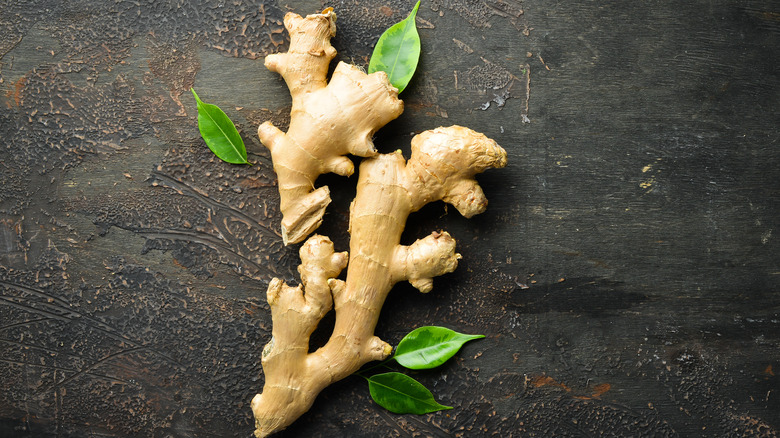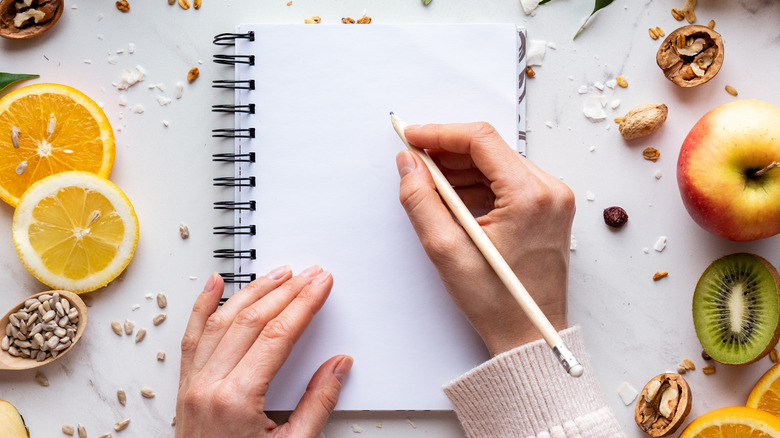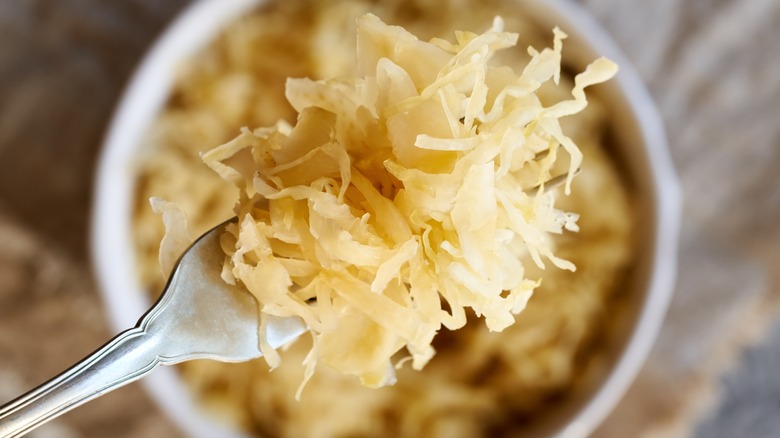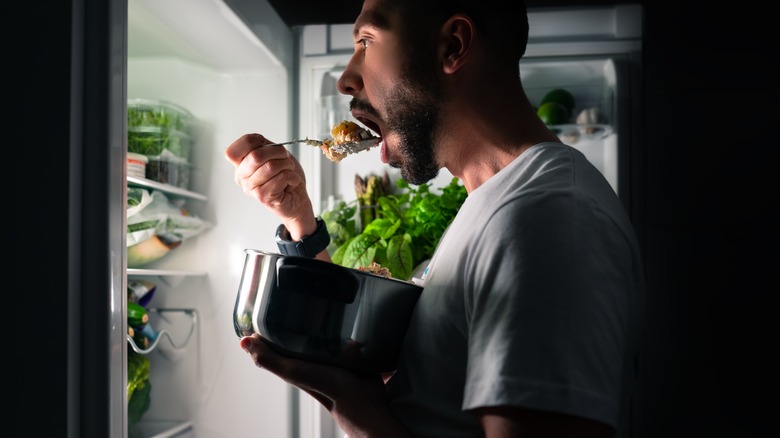13 Ways To Naturally Improve Your Digestion
Whether you realize it or not, you probably want your digestion to be better. We mean, sure, it's probably not as high up there on the list of desires when it comes to the body (we'd be willing to bet that clear skin and rippling muscles usually place higher on people's priority list), but who doesn't wish for their food to travel through their body without a hitch, heartburn- and constipation-free? Unfortunately, though, this can feel like a distant dream for a lot of people. Approximately 40% of all people experience functional gastrointestinal disorders like bloating, gas, and abdominal pain, according to a study published in Gastroenterology.
But the good news is that it needn't be that way for everyone. While digestion may seem like an elusive process, understanding it a little more and how you can make simple changes to benefit your digestive process could put your stomach (and your entire gastrointestinal tract) in the best shape of its life. And the great news is that some of the ways you can improve your digestion are way easier than you think. Let's take a look at some of our top tips for better digestion.
First things first, let's break digestion down
To figure out how we can make our digestion better, it's useful to know how digestion works in the first place. Our digestive system is comprised of our gastrointestinal tract, running from our mouth to our anus, and includes our esophagus, stomach, and intestines, according to the National Institute of Diabetes and Digestive and Kidney Diseases. Our pancreas, gallbladder, and liver are also involved, and together, all of these parts work to extract nutrients from the food we eat and break it down as it moves through the GI tract via a process called peristalsis, muscular contractions and relaxations that push the material through. The resultant waste products are turned into urine and poop, which we then get rid of at the other end.
The problem is that our food and drink go on a pretty long journey through our bodies, and issues can arise at multiple points along the way. Commonplace issues like constipation and gastroesophageal reflux disease (GERD) make our digestion more difficult and can be prompted by a host of different things (per Healthline). And when our digestion starts to suffer, so does our ability to successfully process everything we consume into adequate nourishment, which is why it's so important to do what we can to keep it moving along normally.
Load up on fiber in your diet
Fiber, oh, fiber. Let's count the ways that you improve our digestion. In fact, if we did that, we'd probably be here all day, so probably best to keep it to the topline points — but trust us when we say that eating more fiber is one of the best things you can do for your digestive system.
Fiber is particularly important for our digestion because of its ability to regulate bowel movements and our stools, according to Everyday Health. When we eat more fiber, our poop passes through our bowels more easily, both promoting a more natural transit of food through the system and assisting in preventing conditions like diverticulosis, says gastroenterologist Dr. Sutha Sachar. Eating more fiber may also reduce your risk of developing colon cancer.
But it's not just your stools that benefit when you eat more fiber. The more you eat, the more the microbiome in your stomach will improve, and fiber can be particularly beneficial to the strength of your mucosal lining, states gastroenterologist William Chey. This may help to lessen your risk of a host of chronic inflammatory conditions and keep your digestive system working smoothly and effortlessly.
Make sure you're getting enough water
Okay, pause for a sec. Now ask yourself this question: "How much water have I drunk today?" Might be slightly less than you think, right? We're constantly told about the importance of drinking water, and yet the vast majority of people simply don't drink as much as they should, according to a survey discussed via the New York Post. But staying adequately hydrated is not just good for your general health, but is also one of the best things you can do for your digestion. The more water we drink, the better our body can break down the food that we eat and extract the nutrients we need for our day-to-day life, according to the Mayo Clinic.
Drinking good amounts of water also affects our stools. Consistent hydration allows our poop to remain soft and easy to pass, and assists in preventing constipation, for which dehydration is a huge cause (per WebMD). This can create a backup in our digestive system, with stools that are hard and uncomfortable to pass, thanks to the body absorbing water from them to compensate for the lack of fluid in our system.
Bring your stress levels down
When we're stressed, it's not just our heads (and our emotions) that feel the effect. Our whole body can be impacted by stress, including our digestive system. Living in a state of stress can wreak havoc on our digestion, with some people experiencing more frequent bowel movements and others experiencing more constipation or stomach pain, according to the NHS. Long-term stress can also increase your risk of developing or worsening more serious conditions, like stomach ulcers or irritable bowel syndrome (IBS).
But by reducing our stress levels, we can reduce the likelihood of our digestion being negatively affected, and keep things running smoothly. Simple adjustments to your lifestyle, like getting adequate amounts of sleep and maintaining a good exercise regime, can allow you to manage stress more readily. It can also be beneficial to use your meals as a chance to pause and take stock, as opposed to wolfing them down between jobs or errands. Not only will that not do your stress levels any favors (food is meant to be enjoyed, after all!), but it will also heighten the likelihood of indigestion and other digestive issues.
Chew your food properly
One of the simplest things you can do to improve your digestion fast is by taking things slow. And if you're the type to practically inhale your meals, this one's for you.
Chewing your food more thoroughly can boost your digestive capacity surprisingly effectively, thanks to the additional work your mouth does in making things easier as your food continues its journey (via Healthline). By breaking your food down into smaller pieces and combining it with more saliva, your meal has a smoother passage through your stomach and small intestine, quietening things down there. The additional saliva production that occurs when you chew thoroughly can also assist in reducing symptoms of heartburn.
So how much should you be chewing each mouthful? While each person, and each meal, will be different, a ballpark figure of 32 chews before swallowing should be more than adequate for most foods, says Intestinal Labs. Harder-to-consume foods (like particularly tough steak) or hard food items could need even more chews than that, while you might get away with less for softer foods.
Exercising regularly can keep your digestion in check
Our digestive system does the best job of moving our food through our system, and frankly, we could afford to give it a hand by doing a little movement ourselves. And that movement pays dividends, folks, with regular exercise being one of the best things you can do for healthy digestion.
Exercising boosts the blood flow throughout our bodies, which includes blood flow to our digestive system, according to Livestrong. This can assist it in maintaining a healthy digestive process and keeping the peristalsis that moves food through our system operating at the best level it can (per AXA Health).
Furthermore, regular exercise is a serious stress-buster, which can work to limit the negative impacts of a stressful lifestyle on the digestive system. The increased motility and speed that exercise encourages for our digestive system can also reduce the risk of constipation, thanks to its effects on the movement of food through the large intestine specifically (per WebMD). Just make sure that you're not exercising too much, as this may create unpleasant consequences for your intestinal health. It can also (somewhat counterproductively) result in higher stress levels, which may create further complications for your stomach.
Have a cup of mint tea
We are firm believers in the fact that flicking on a kettle and pouring a cup of tea can solve pretty much all of life's problems. And when it comes to digestion, we are very pleased to report that mint tea, in particular, could be seriously beneficial. Peppermint tea could provide quick relief to digestive issues like bloating or excess gas, says Healthline. Its effects on calming the stomach muscles and reducing spasms mean that it may be especially helpful for folks who experience regular abdominal pain, as a study published in the journal Pediatrics shows.
Peppermint tea and peppermint extract may also be useful for people who experience long-standing digestive conditions. Another study, published in the Journal of Clinical Gastroenterology, demonstrated that when participants with irritable bowel syndrome consumed peppermint oil, their symptoms were less prominent. It's important to bear in mind, though, that if you regularly experience heartburn, peppermint tea could actually make your symptoms worse due to its relaxant effects on your lower esophageal sphincter, as Mount Sinai discusses. If you're introducing peppermint into your diet to calm your digestive system, make sure you do so slowly, and monitor how your body responds.
Slow down your eating
Once upon a time, someone uttered the phrase "time is money," and the world was changed forever — and in our opinion, probably for the worse. The ideology of trying to save time where we can to spend it elsewhere has also infiltrated our eating habits, with people routinely eating too quickly (per WebMD). But not only does this stop us from enjoying our meals fully, but it also means that we can tend to eat more than we need to, which results in feeling overfull, experiencing indigestion and other digestive issues, and generally creating more stress on our digestive system.
That's why we recommend slowing your eating pace right down. Bear in mind that it takes your brain, on average, 20 minutes from eating to send signals that indicate that you're full. As such, by slowing your eating down, you create a better balance between your quickly-filling stomach and your brain, and all this results in less overeating. While this can be difficult to do at first, a good way of encouraging yourself to do so is to not leave too long between meals, so you won't feel the urge to refuel as quickly as possible from a hungry state. You can also try drinking a glass of water before or after a meal, to generate a further sense of fullness.
Get a good amount of sleep every night
We haven't met a single person alive yet that doesn't enjoy a good night's sleep, and to be honest, we don't think we're going to. But getting your zzz's in is beneficial for way more than just your mood the next day. There's a clear link between getting enough sleep and maintaining proper digestion, as research published in the Journal of Neurogastroenterology and Motility shows. Bowel movements, specifically in people who have irritable bowel syndrome, appear to be less consistent and predictable when sleep is disrupted or of poor quality.
Additionally, it might not just be getting enough sleep that helps your digestion, but also how you do it. Sleeping on your left side might provide benefits for your digestive system and allow your stools to move through your system more healthily, according to Healthline. This is all because of our old friend, gravity. Sleeping on your left-hand side puts your body in a position where waste can more readily travel through from your ascending colon to the transverse colon, and then down to your descending colon, where it's ready to be pooped out.
Add some ginger to your meals
In news that will shock absolutely no one, what we eat has a powerful effect on our digestive health. But the good news is, you don't just have to avoid food in your diet to maintain a robust digestive system, as adding food to your diet can also provide powerful benefits. Ginger is one such food, thanks to what it's composed of. "Gingerol, a natural component of ginger root, benefits gastrointestinal motility ― the rate at which food exits the stomach and continues along the digestive process," explains Johns Hopkins Medicine clinical dietitian Emma Slattery via Johns Hopkins Medicine. As a result, your food won't sit in your stomach for too long, potentially resulting in heartburn or indigestion.
But ginger's benefits to the digestive system don't just stop there. The spicy root can also effectively bring down your gas and bloating levels by reducing excess fermentation in the gut and preventing constipation. Ginger's ability to help move food through the stomach also means that it's a powerful anti-nausea tool. And aside from all of these digestive bonuses, ginger is also a natural anti-inflammatory, which may assist in bringing down the risk of long-term chronic conditions caused by inflammation. Plus, it enhances the flavor of most dishes. Those are more than enough reasons for us.
Keeping a food diary may be beneficial for digestion
What did you eat for lunch yesterday? What about the day before that? And what about a week ago? If you're like us, you'll be finding at this point that it's pretty difficult to remember. But there's a simple thing you can do to not only keep track of how your diet's looking for a range of health purposes, but also to weed out any potential inhibitors to good digestion: Keep a food diary, says Medical News Today. By keeping track of what you eat and drink and taking note of any response your digestive system has, you'll be able to pinpoint what could be prompting your digestive woes and remove them from your diet.
Food diaries also give nutritionists or doctors a good guide to what you're eating and how best to improve your digestion. When you're keeping a food diary, leave no stone unturned. You should be writing down not only what you're eating, but also how it's prepared, advises Harvard Health Publishing. Make sure you're including the amounts of the things you're eating, being as precise as possible, and don't forget to include any add-ons to your meal (like condiments or dressings). If possible, it's best to write things down immediately after eating a meal, as opposed to waiting until the end of the day, to ensure specificity.
Incorporate fermented foods into your diet
Although they've been around for thousands of years, it's hard to think of a time when fermented foods have been this hot. These days, kimchi, sauerkraut, yogurt, and kombucha are all firm favorites around the world for their health benefits as much as their flavors, and one of the reasons why they're so beloved is thanks to their positive effects on digestion, as the Cleveland Clinic notes. Fermented foods support our digestive system by giving our gut microbiome something to feed on, which then strengthens its ability to digest the other food you eat properly, leading to an overall better digestive process.
Also, having a stronger microbiome benefits you far more than just giving your food a little help. When our gut bacteria are abundant and functioning correctly, it gives our immune system a boost, and a more diverse gut microbiome may also lead to lower overall inflammation. This could have powerful implications for people who have digestive issues associated with digestion, like inflammatory bowel disease. Diverse gut bacteria also make the food we eat more useful to our bodies, with nutrients being better processed.
Eat mindfully
So look. It's a busy world. We all know it. And sometimes, you don't have time to plan a meal every day, or even have time to sit down and eat one. But when our eating habits go out the window, our digestion can take a hit. And that's why we recommend practicing mindful eating — the process of applying mindfulness techniques to our food consumption — to boost your digestion (per Healthline). For something so simple, eating mindfully has been shown to have a powerful effect, with research published in Evidence-Based Complementary and Alternative Medicine finding that applying mindfulness around eating may benefit folks with functional gastrointestinal disorders, specifically IBS.
So what does mindfulness eating entail? It's pretty simple: It's all about bringing your awareness and attention to your food. Eat slowly, ideally without any distractions like a TV or your phone, and make sure you're chewing your food thoroughly. Take note of the flavors, textures, and smells of the food you're eating, and ask yourself how your food is making you feel as you eat it. By focusing on your food in such intense detail, you might find that your behavior around food changes positively, having knock-on health effects beyond better digestion (such as weight loss).
Try not to eat late at night
Let's be real, we all love a midnight snack now and again. Sure, dinner time may be long gone and you're about to go to bed, but that cheese in your fridge? It looks good. But eating late at night can have a surprisingly big impact on your digestive system, as Healthline states. When you eat, your food moves vertically through your gastrointestinal tract, but when you lie down too soon after eating, it's not able to do so properly. As a result, your food can move back up into your esophagus, resulting in indigestion and heartburn.
Fortunately, the solution is simple: Finish eating earlier in the day. Ideally, you should leave around three to four hours after eating before you lie down, to make sure that all of your food has been digested sufficiently. Resisting lying down after eating at any point in the day, not just at bedtime, is also advised, and if you have pre-existing gastrointestinal conditions like GERD or a hiatal hernia, you should remain upright for as long as possible (per Well+Good).

